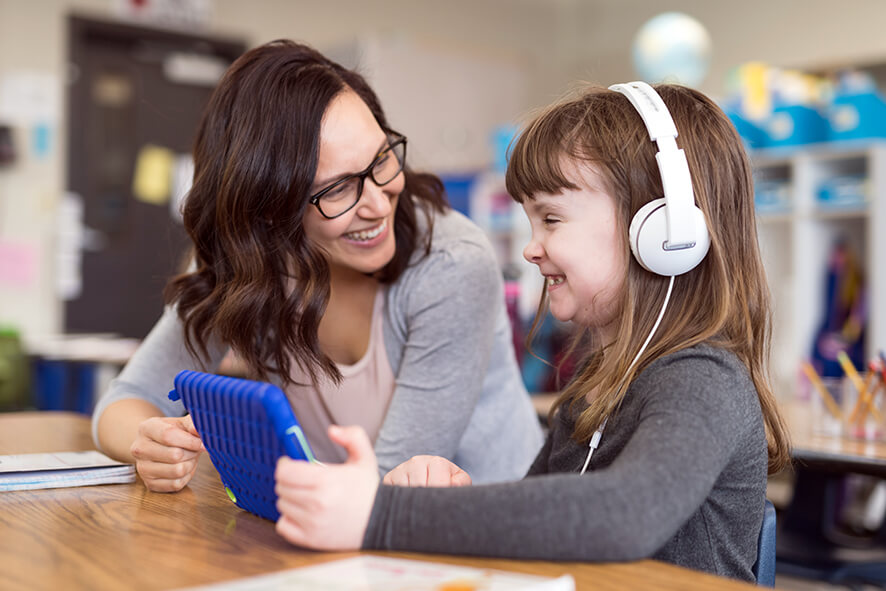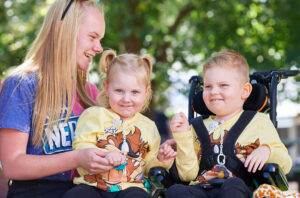
Reasonable adjustments
Schools have legal obligations to support your child’s access and participation at school by making what’s called ‘reasonable adjustments’.
There are many ways that school can support your child’s learning in partnership with you. An inclusive approach by schools can inform a range of decisions – from building works, to new programs, curriculum planning, professional development and the venue for school camps.
At the classroom level, teachers can make plans and choose teaching and learning strategies that are inclusive and meet the needs of all students, including those with disability.
What are reasonable adjustments?
Under the Disability Standards for Education, schools and education providers must make reasonable adjustments so that students with disability can participate on the same basis as other students. This can include making changes to the curriculum and programs, teaching approaches, the classroom, or accessing support services. For an adjustment to be reasonable, it has to be fair to everyone involved.
Adjustments made to support students with disability can also be helpful to other students as well. Professional development for school staff can help to build capacity across the school, to better meet the needs of all students.
Schools can make many different kinds of adjustments to meet your child’s needs, in many different areas. For example, adjustments can be aimed at supporting your child’s:
- Learning
- Personal care or medical needs
- Participation in all school activities
- Communication
- Social inclusion
If an activity, facility, service or program cannot be adjusted or made accessible or suitable for your child, the school is legally required to offer an alternative comparable to what is offered to students without disability.
New approaches to supporting students with diverse learning needs are being developed all the time. Your input and ideas are also of great value, as you know your child best. You should feel confident to offer them through the Student Support Group and in communication with your child’s teachers.
What are some examples of reasonable adjustments?
Tailoring the teaching approach
- Choosing activities for the whole class with your child’s needs in mind
- Breaking down information into smaller chunks
- Writing down instructions rather than giving them verbally
- Asking a series of questions to test knowledge
- Modifying the amount or complexity of a task
- Allowing your child to complete the task in a different way from the rest of the class
- Giving more time to complete a task
- Using an Education Support Officer to help your child stay on-task
Meeting access needs
- Providing information in large print
- Providing supportive seating, including on the floor
- Having handrails up steps or ramps to classrooms, toilet and play equipment
- Providing pencil grips or slated boards
Supporting self-regulation
- Adjustments to uniform requirement (e.g. allowing students to wear PE uniform every day)
- Providing movement breaks
- Having quiet spaces
- Providing visual timetables
- Supporting the wearing of headphones
- Having lockers and trays in easy to access places
Supporting your child’s communication and care
- Providing access to communication devices at all times
- Training for teachers and support staff in how to use communication devices
- Training for staff around your child’s personal care or medical needs
- Providing toileting support as needed
Modifying assessment tasks
- Allowing use of assistive technology, such as a laptop, rather than handwritten assessments
- Asking a series of questions rather than requiring a written response
- Additional time for assignments or exams
- Rest breaks and quiet rooms for exams
Involving therapists
- Consulting with your child’s speech pathologists, occupational therapists, physiotherapists, and psychologists
- Having therapists provide training to school staff
Supporting social inclusion
- Using tools and strategies to encourage all students to communicate effectively
- Teaching students the social skills they need to include each other in play
- Providing supervised or structured activities at recess and lunch time
Supporting positive student behaviour
- Explicitly teaching behaviour skills
- Developing Behaviour Support Plans to identify underlying causes and put in place supportive strategies



